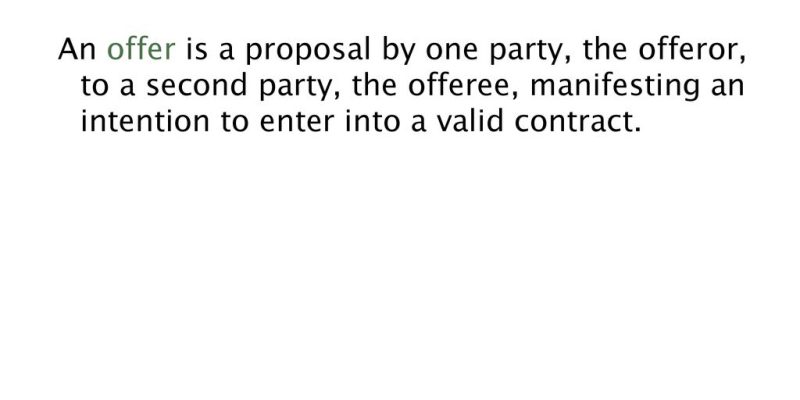Offeree Definition: Understanding the Role in Contract Law

In the realm of contract law, understanding the roles of the offeree and the offeror is essential. These terms define the parties involved in forming a contract, with each playing a specific role in the process of agreement formation.
This article focuses on the offeree definition, clarifying their definition, responsibilities, and significance in legal agreements.
What Is an Offeree?
Definition
An offeree is the individual or entity to whom an offer is made in the context of a contract. The offeree has the power to:
- Accept the Offer: Agree to the terms, resulting in a binding contract.
- Reject the Offer: Decline the terms, ending the negotiation.
- Counter the Offer: Propose new terms, effectively becoming the offeror.
Example:
- If a seller offers a product for a specific price, the buyer (offeree) can accept, reject, or negotiate the terms.
The Role of the Offeree in Contract Formation
- Decision-Maker
The offeree evaluates the offer and decides whether to accept or reject it based on their interests and requirements. - Acceptance Powers
The offeree’s acceptance must align with the terms of the offer for the contract to be valid. Any changes to the terms constitute a counteroffer. - Legal Boundaries
Acceptance by the offeree must be communicated clearly and within the timeframe specified (if any) by the offeror.
Offeree vs. Offeror
Offeror
- The party that initiates the contract by proposing terms and conditions.
- Responsible for outlining the offer clearly and setting any conditions for acceptance.
Offeree
- The recipient of the offer, with the authority to accept, reject, or counter the terms.
Key Differences
| Aspect | Offeror | Offeree |
| Role | Makes the offer | Receives the offer |
| Action | Proposes terms | Accepts, rejects, or counters |
| Initiation | Starts the contract process | Responds to the offer |
Legal Considerations for the Offeree
1. Timely Response
The offeree must respond to the offer within the time specified by the offeror, or within a reasonable timeframe if none is provided.
2. Clear Communication
Acceptance must be communicated clearly, either verbally, in writing, or through conduct that demonstrates agreement.
3. Mirror Image Rule
In many jurisdictions, the offeree’s acceptance must match the offer’s terms exactly for the contract to be valid. Deviations result in a counteroffer.
4. Silence as Acceptance
Silence is generally not considered acceptance unless there is a prior agreement or established practice between the parties.
Examples of Offeree in Action
Example 1: Real Estate Transaction
- Offeror: A homeowner offers to sell their house for $500,000.
- Offeree: The potential buyer reviews the terms and decides to accept, reject, or negotiate a lower price.
Example 2: Employment Offer
- Offeror: A company offers a job to a candidate with specific terms (salary, role, benefits).
- Offeree: The candidate decides whether to accept the offer or negotiate the terms.
Importance of Understanding the Offeree’s Role
- Ensures Clear Communication
Knowing the offeree’s responsibilities helps avoid misunderstandings during negotiations. - Facilitates Legal Compliance
Proper acceptance by the offeree ensures the validity of contracts and protects both parties legally. - Streamlines Contract Formation
Understanding roles streamlines the process, making it easier to finalize agreements efficiently.
Conclusion
The offeree plays a vital role in contract formation, holding the authority to accept or reject an offer. Their decision determines whether an agreement progresses or concludes, making their role critical in any negotiation.
By understanding the offeree’s responsibilities and legal boundaries, both parties can navigate the contract process confidently and avoid potential disputes.
FAQs
1.What is an offence in contract law?
An offeree is the person or entity to whom an offer is made, with the authority to accept, reject, or counter the terms.
2.How does an offeree accept an offer?
An offeree accepts an offer by clearly communicating agreement to the terms within the specified timeframe.
3.What happens if the offeree changes the terms of the offer?
Changing the terms constitutes a counteroffer, which makes the original offer the new offeror.
4.Can silence be considered acceptance by the offeree?
Generally, silence is not acceptable unless there is a prior agreement or established practice between the parties.
5.What is the difference between an offeree and an offeror?
The offeror initiates the contract by proposing terms, while the offeree is the recipient who decides whether to accept or reject the offer.
Also read: ASE Exchange: Understanding the Basics of the Amman Stock Exchange











